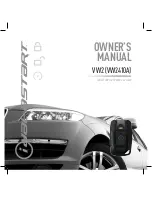
4
Safety Precautions
Prohibited
Do not operate when you are tired, not feeling well or under the influence of alcohol or
drugs.
Your judgment is impaired and could result in a dangerous situation that may cause
serious injury to yourself and others.
Before you turn on the power switch on the transmitter, always check to see that the
trigger is at the neutral position. Always turn the transmitter on first, then the receiver.
When you turn the system off, always turn the receiver off first and then the transmit-
ter. This step is very important. Always follow this procedure.
If this procedure is not followed, injury to yourself and others as well as loss of control
could occur.
Adjustment Note
Make all adjustments to the radio control system with engine not running, or the elec-
tric motor disconnected.
If the engine is running or the motor is connected while adjustments are made, the
model may run out of control.
Remove the main battery source from electric powered models when they are not
being used.
Should you accidentally leave the receiver switch on, the model could run out of control.
Caution
Do not touch
Do not touch the engine, motor, speed control or any part of the model that will gener-
ate heat while running.
Touching hot parts will result in serious burns.
Storage and Disposal Safety Precautions
Warning
(When using a Ni-cad battery to power your system)
At the end of a day's operation, store the system with Ni-cad battery discharged. Be
sure to recharge the system before it is used again.
You should fully discharge your system's batteries periodically to prevent a condition
called "memory". For example, if you only make two runs in a day or you regularly use
a small amount of battery's capacity, the memory effect can reduce the actual capacity
even if the battery is charged for the recommended amount of time.
Prohibited
Do not throw a Ni-cad battery into a fire. Do not disassemble or attempt to repair a Ni-
cad battery pack.
Overheating, damage and acid leakage may lead to burns, loss of eye sight as well as
numerous other types of injuries. The electrolyte in Ni-cad batteries is a strong alkali.
Should you get even the smallest amount of the electrolyte in your eyes, Do Not rub,
wash immediately with water, and seek medical attention at once. The electrolyte can
cause blindness. If electrolyte comes in contact with your skin or clothes, wash with
water immediately.
Summary of Contents for 2PL
Page 1: ...2PL INSTRUCTION MANUAL...
Page 22: ......







































